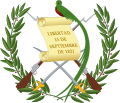 | |
Guatemala | Taiwan |
|---|---|
Guatemala and the Republic of China (ROC, Taiwan) established bilateral relations in 1933. [1] Following the ROC's relocation to Taiwan, Guatemala has maintained diplomatic relations with the ROC rather than the mainland People's Republic of China. As of 2024, Guatemala is one of 11 nations to formally recognize Taiwan, and the oldest contuining nation to do so. [2]

